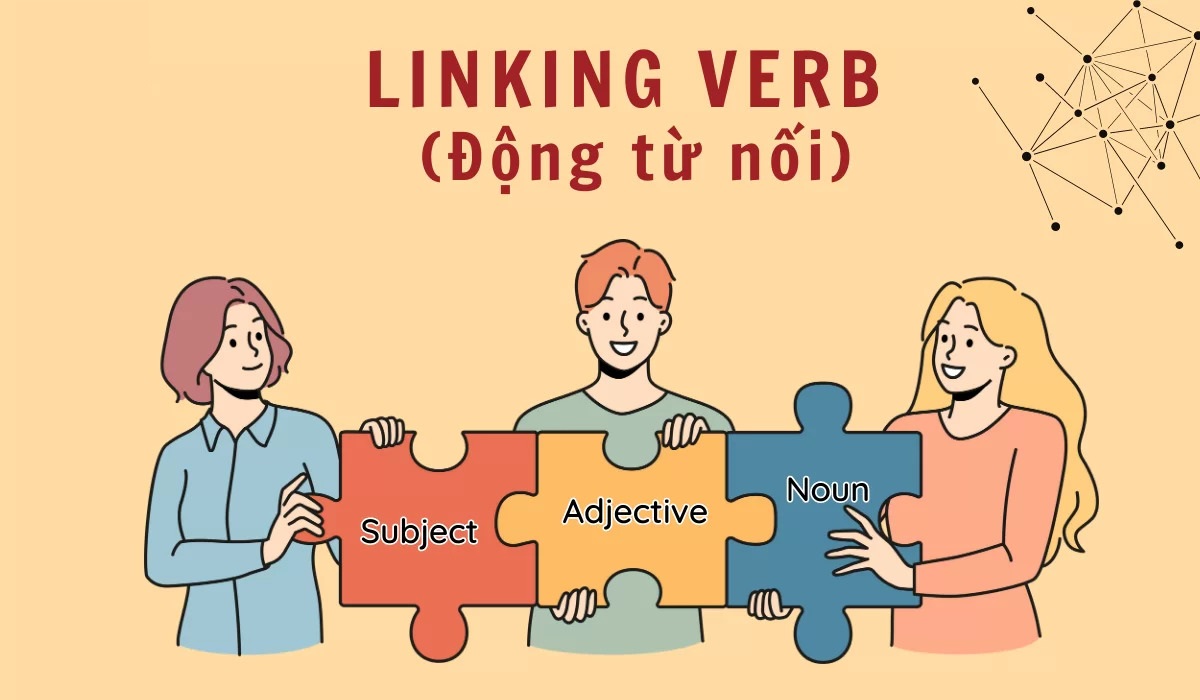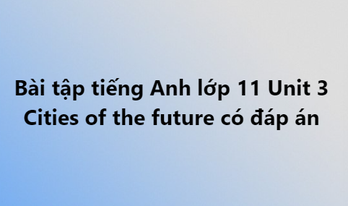Dưới đây là một số bài tập tiếng Anh lớp 12 Unit 8 Life in the future có đáp án đã được biên tập và soạn thảo để các em học sinh tham khảo, luyện tập và đạt được điểm cao trong các bài kiểm tra cũng như trong các kì thi sắp tới.
Mục lục bài viết
1. Bài tập đọc tiếng Anh lớp 12 Unit 8 Life in the future có đáp án:
A new report shows what life might be like 100 years from now. It describes skyscrapers that are much taller than today’s buildings, underwater ‘bubble’ cities, and holidays in space. The report is from Samsung’s SmartThings. It asked experts on space, architecture, and city planners to give their ideas on life in 2116. They said the way we live, work, and play will be different to how we do these things today. The experts said that 25 years ago, people could not imagine how the Internet and smartphones would change our lives. The Internet has revolutionized the way we communicate, learn and do daily things. The experts said the changes in the next century would be even more unbelievable.
Researchers questioned 2,000 adults about the predictions they thought were most likely to happen in the future. They predicted that in the future, few people will go to an office but will work from home and have virtual work meetings. People will have advanced 3D printers that will let them download a design for furniture or a food recipe and then ‘print’ the sofa, table, or pizza at home. There will also be less need for visits to the doctor. We will all have a home health capsule that will tell us what the problem is and give us treatment. We will also be going into space for holidays and to get resources that we have used up on Earth. A prediction that was missing was whether people would still need to study English.
Question 1: TRUE / FALSE: Read the headline. Guess if a-h below are true (T) or false (F).
| a. | Buildings in the future will be shorter than today’s buildings. | T / F |
| b. | Experts say people will be living in underwater cities. | T / F |
| c. | The report is from the tech company Apple. | T / F |
| d. | Experts say the changes to come by 2116 will be unbelievable. | T / F |
| e. | Researchers asked 20,000 people about the future. | T / F |
| f. | People will be able to print download and print pizzas. | T / F |
| g. | People won’t need to go to the doctor as much as they do now. | T / F |
| h. | People predicted that we will still need to study English. | T / F |
Đáp án:
| a | F | b | T | c | F | d | T | e | F | f | T | g | T | h | F |
Question 2: SYNONYM MATCH: Match the following synonyms from the article.
| 1. | report | a. | futuristic |
| 2. | experts | b. | completely |
| 3. | totally | c. | transformed |
| 4. | revolutionised | d. | finished |
| 5. | unbelievable | e. | study |
| 6. | questioned | f. | plan |
| 7. | advanced | g. | specialists |
| 8. | design | h. | medical care |
| 9. | treatment | i. | asked |
| 10. | used up | j. | incredible |
Đáp án:
| 1. | report | a. | study |
| 2. | experts | b. | specialists |
| 3. | totally | c. | completely |
| 4. | revolutionised | d. | transformed |
| 5. | unbelievable | e. | incredible |
| 6. | questioned | f. | asked |
| 7. | advanced | g. | futuristic |
| 8. | design | h. | plan |
| 9. | treatment | i. | medical care |
| 10. | used up | j. | finished |
2. Bài tập viết tiếng Anh lớp 12 Unit 8 Life in the future có đáp án:
Question. Write the correct future forms using the verbs in brackets ( ).
1. Los Angeles is a great city. I’m sure you (have) a good time there.
2. I’m not sure but we (see) Catrina at the funeral tomorrow.
3. I’ve already decided. I (phone) my bank manager tomorrow.
4. The next course (start) on 1 July. That’s what the website says.
5. The meeting (be) over by six. They don’t usually take more than an hour.
6. I (help) you do the washing up if you like.
7. Bella and I (get) married in the summer. We’ve already agreed on the date.
8. This time tomorrow we (fly) to New Zealand. We’ll be about halfway through the flight.
9. We (run out) of coffee soon. The tin’s almost empty.
Đáp án:
1. Los Angeles is a great city. I’m sure you will have | ‘ll have (have) a good time there.
2. I’m not sure but we might see | may see | could see (see) Catrina at the funeral tomorrow.
3. I’ve already decided. I am going to phone | ‘m going to phone (phone) my bank manager tomorrow.
4. The next course starts (start) on 1 July. That’s what the website says.
5. The meeting should be (be) over by six. They don’t usually take more than an hour.
6. I will help | ‘ll help (help) you do the washing up if you like.
7. Bella and I are getting (get) married in the summer. We’ve already agreed on the date.
8. This time tomorrow we will be flying | ‘ll be flying (fly) to New Zealand. We’ll be about halfway through the flight.
9. We are going to run out | ‘re going to run out (run out) of coffee soon. The tin’s almost empty.
3. Bài tập nói tiếng Anh lớp 12 Unit 8 Life in the future có đáp án:
Question 1: Will traditional festivals and holidays still exist?
Traditional festivals and holidays are an important part of human culture and history. They reflect the values, beliefs, and traditions of different groups of people, and they provide opportunities for social bonding, celebration, and learning. However, in the modern world, some factors may threaten the existence or relevance of traditional festivals and holidays. These factors include globalization, secularization, migration, environmental issues, and technological changes.
Globalization refers to the increasing interconnectedness and interdependence of people and countries around the world. It can have positive effects, such as promoting cultural diversity, exchange, and cooperation. But it can also have negative effects, such as eroding local identities, traditions, and languages. Some people may feel that their traditional festivals and holidays are losing their meaning or significance in the face of global influences and trends.
Secularization refers to the decline of religious influence and authority in society. It can have positive effects, such as promoting tolerance, pluralism, and human rights. But it can also have negative effects, such as weakening the sense of community, morality, and spirituality. Some people may feel that their traditional festivals and holidays are losing their relevance or importance in the face of secular values and lifestyles.
Migration refers to the movement of people from one place to another for various reasons, such as economic opportunities, political conflicts, or personal choices. It can have positive effects, such as enriching cultural diversity, exchange, and integration. But it can also have negative effects, such as creating cultural clashes, conflicts, or isolation. Some people may feel that their traditional festivals and holidays are losing their continuity or authenticity in the face of migration challenges and changes.
Environmental issues refer to the problems that affect the natural environment and human well-being, such as climate change, pollution, deforestation, or biodiversity loss. They can have positive effects, such as raising awareness, action, and innovation. But they can also have negative effects, such as disrupting natural cycles, resources, and habitats. Some people may feel that their traditional festivals and holidays are losing their feasibility or sustainability in the face of environmental threats and constraints.
Technological changes refer to the developments and innovations that affect various aspects of human life, such as communication, education, entertainment, or health. They can have positive effects, such as enhancing convenience, efficiency, and quality. But they can also have negative effects, such as reducing human interaction, attention span, or creativity. Some people may feel that their traditional festivals and holidays are losing their charm or appeal in the face of technological alternatives and distractions.
In conclusion, traditional festivals and holidays may face various challenges and pressures in the modern world. However, they may also adapt and evolve to suit the changing needs and preferences of people. Therefore, traditional festivals and holidays may still exist in the future, but they may look different from how they are today.
Question 2: Do you think people will contact aliens in the future? What other paranormal phenomena can be true in the future?
There are many arguments for and against the possibility of extraterrestrial intelligence, ranging from the vastness of the universe and the rarity of life to the Fermi paradox and the Drake equation. Some people believe that aliens have already visited Earth, while others are skeptical or even hostile to the idea.
Another related topic is the existence of paranormal phenomena, such as ghosts, telepathy, psychokinesis, and precognition. These phenomena are often considered to be pseudoscientific or supernatural and have not been conclusively proven by mainstream science. However, some researchers and enthusiasts claim that there is evidence for these phenomena, or that they can be explained by alternative theories of physics or consciousness. Some people also speculate that paranormal phenomena may be connected to alien activity or other dimensions.
In the future, it is possible that humans will discover new ways of exploring the universe and the mind, and that they will encounter phenomena that challenge their current understanding of reality. Perhaps they will find signs of alien life, or communicate with other beings through psychic means. Or maybe they will realize that some of the paranormal phenomena they experience are natural phenomena that can be explained by science. Whatever the case may be, the future holds many mysteries and surprises for humanity, and it is up to us to be curious and open-minded about them.


















